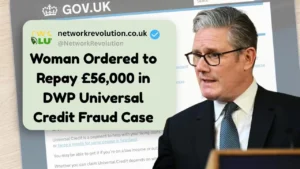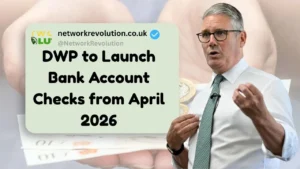The UK Government is reinstating the Winter Fuel Payment for the 2025–26 season, giving millions of pensioners much-needed financial help as energy bills remain high. The Department for Work and Pensions (DWP) has outlined eligibility rules, income thresholds, and payment timelines, ensuring that older households can manage heating costs more comfortably this winter.

According to officials, around nine million pensioners will benefit — a significant rise from last year’s restricted pool — with individual payments ranging between £100 and £300, depending on age and circumstances.
“No older person should have to choose between heating and eating,” said Helen Whately, Minister for Social Care, calling the payment “an essential safeguard for pensioners through the winter months.”
Also Read Woman Ordered to Repay £56,000 in DWP Universal Credit Fraud Case
Woman Ordered to Repay £56,000 in DWP Universal Credit Fraud Case
Overview of the Winter Fuel Payment 2025–26
| Particulars | Details |
|---|---|
| Administered by | Department for Work and Pensions (DWP) |
| Payment Range | £100 – £300 |
| Eligibility Birth Date | Born before 22 September 1959 |
| Income Cap | £35,000 (above which payment reclaimed via tax) |
| Automatic Eligibility | State Pension, Pension Credit, or qualifying benefits |
| Payment Dates | November – December 2025 |
| Application Window | 15 September 2025 – 31 March 2026 |
| Regions Covered | England, Wales, Northern Ireland (Scotland operates a separate system) |
Eligibility Rules
To qualify, individuals must:

- Be born before 22 September 1959, and
- Be living in the UK during the qualifying week (15–21 September 2025).
Automatic eligibility applies if you already receive:

- State Pension or Pension Credit
- Universal Credit, DLA, PIP, Attendance Allowance, or Carer’s Allowance
- Income-related ESA, JSA, or Incapacity Benefit
Residents in care homes, those hospitalised for the entire qualifying week, or living abroad are generally excluded.

“The system is built to ensure payments go directly to the people who need them most — automatically, efficiently, and without unnecessary bureaucracy,” noted Paul Johnson, Director of the Institute for Fiscal Studies (IFS).
How Much Pensioners Will Receive?
| Household Type | Born 22 Sep 1945 – 21 Sep 1959 | Born Before 22 Sep 1945 |
|---|---|---|
| Living alone / only eligible person | £200 | £300 |
| Living with another eligible person | £100 each | £150 each |
| Living in a care home | £100 | £150 |
Couples claiming jointly will have their total capped based on age group and benefit status. Those on low incomes may also qualify for additional support through Pension Credit or Cold Weather Payments.
Income Rule – £35,000 Threshold
The reintroduced income rule is designed to balance fairness and fiscal responsibility:
- Pensioners with annual incomes up to £35,000 receive full payment.
- Those earning above this threshold will still receive it but will repay the amount via HMRC taxation in 2026.
This system ensures that support reaches lower-income pensioners while maintaining equity across taxpayers.
“This approach targets relief where it’s most needed while maintaining sustainability,” explained Ruth Gregory, Senior Economist at Capital Economics.
When and How Payments Will Be Made?
The DWP will begin sending confirmation letters in October and November 2025, with payments expected to reach accounts between mid-November and late December 2025.
Those not automatically enrolled — for example, pensioners who’ve deferred their State Pension — must apply via:
- Postal applications: open 15 September 2025
- Telephone applications: open 13 October 2025
- Deadline: 31 March 2026
All payments will appear on bank statements as “DWP Winter Fuel” or similar identifiers.
Comparison With Scotland’s Pension Age Winter Heating Payment
| Region | Administering Body | Amount | Automatic Eligibility | Tax Recovery |
|---|---|---|---|---|
| England, Wales, NI | DWP | £100–£300 | Yes | Yes (above £35,000) |
| Scotland | Social Security Scotland | Flat £200 | Yes | No |
While the UK’s version scales by age and household type, Scotland’s model provides a fixed-rate £200 payment, reflecting its independent approach to winter energy support.
Why the Winter Fuel Payment Matters?
Energy costs remain one of the largest financial pressures for retirees.
The average dual-fuel bill for older households in 2025 is still around £1,850 per year, according to Ofgem estimates.
The Winter Fuel Payment serves as a vital safety net, particularly for pensioners living alone or on fixed incomes.
“The reinstatement of this payment is a lifeline,” said Caroline Abrahams, Charity Director at Age UK. “Many older people are already cutting back on essentials — this support helps keep homes warm and safe.”
Recent Policy Updates
- June 2025: Chancellor Rachel Reeves reinstates Winter Fuel Payment.
- September 2025: Income and birth date rules formally published.
- October–November 2025: DWP sends entitlement letters.
- November–December 2025: Payments distributed automatically.
- March 2026: Final claim deadline.
These dates ensure payments arrive before peak energy demand.
Expert Outlook
Analysts predict the Winter Fuel Payment will remain central to the UK’s pensioner welfare system until at least 2030. However, fiscal pressures could lead to future means-testing or integration with Pension Credit.
“With inflation still stubbornly above 3%, even modest heating support can make a major difference to pensioner wellbeing,” commented Richard Murphy, Professor of Political Economy at the University of Sheffield.
FAQs
1. Who qualifies for the 2025–26 Winter Fuel Payment?
Anyone born before 22 September 1959, living in England, Wales, or Northern Ireland during the qualifying week.
2. How much will I get?
Between £100 and £300, depending on your age, living situation, and whether you claim benefits jointly.
3. Do I need to apply?
Not usually — it’s automatic for most State Pension or benefit recipients. Apply only if you’ve never received it or have deferred your pension.
4. When will I be paid?
Between mid-November and December 2025, ahead of the winter heating season.
5. Will it affect my other benefits?
No, it’s tax-free and separate from other entitlements like Pension Credit or Attendance Allowance.
6. What if I earn over £35,000?
You’ll still receive the payment, but it will later be reclaimed via the tax system.

